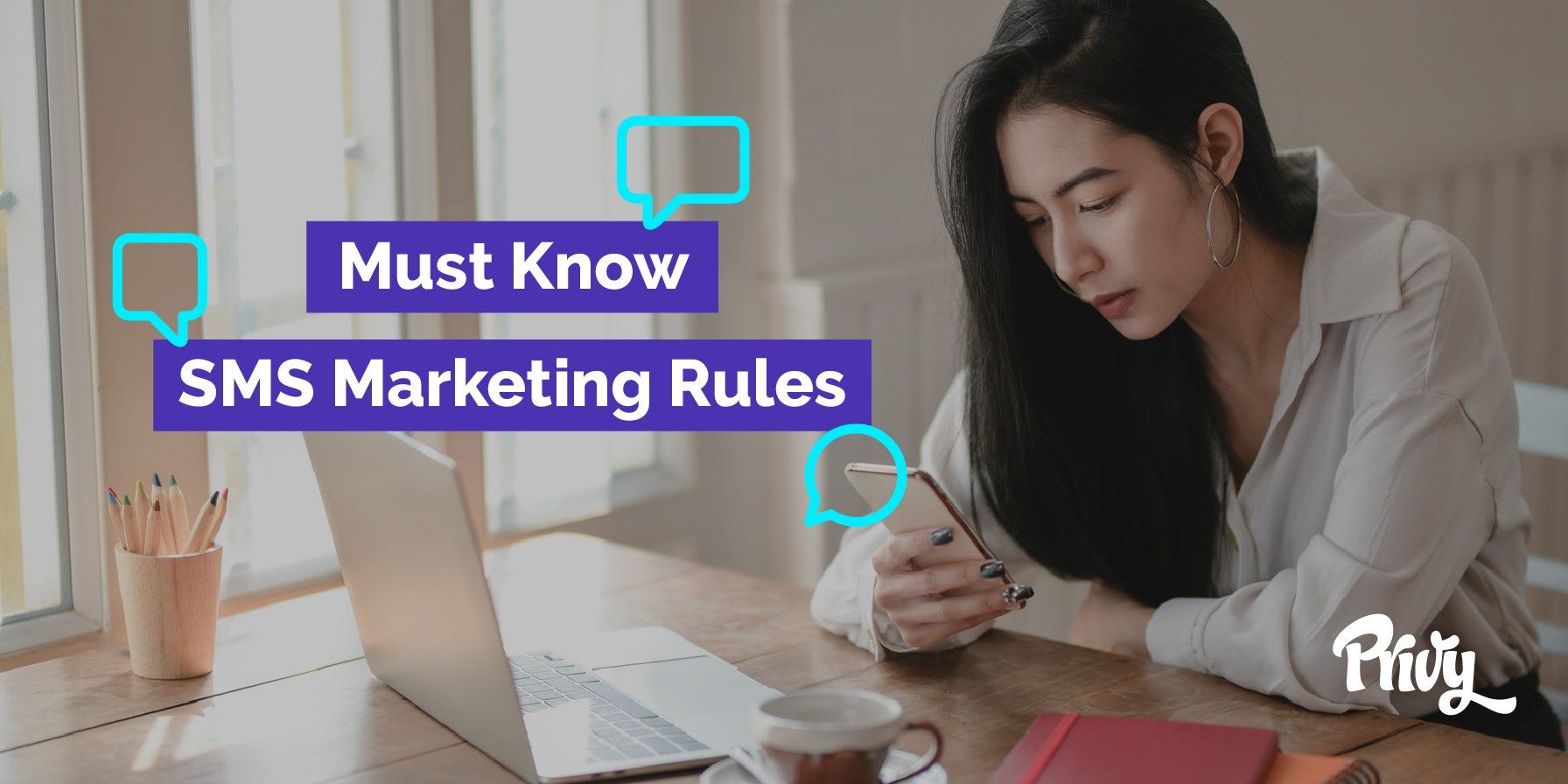SMS Marketing Laws: The Rules You Need to Know
It's no secret that SMS open rates are significantly higher than email open rates. But if you're just getting started, there are a few rules you need to know.

Written by Ryan Pinkham

SMS (or text message) marketing can be a great way to promote timely messages for your business.
SMS has up to 98% open rates and is an often under-utilized marketing method (compare this to email open rates). The key is to learn to do it the right way.
There are a few rules that any business sending SMS messages to customers must follow, and most countries have something similar. For this post, we’ll look at what the US standards are.
Get our best content on ecommerce marketing in your inbox 2 times a week
When can you send an SMS?
Have you ever received a text message at random from a company you don’t know and wondered why you got it? Yep, that company is probably breaking the law. Consumers are protected by laws in the US that say companies are not to send messages unless the person has given their consent.
If there is any number-one rule to know, consent is it. And that doesn’t mean that any customer who gives you their phone number is implying consent - the law says you need explicit consent. This means the recipient of the text message must have been asked for, and given their consent to receive text messages from your company. (The law says “on paper,” but we’ll get to that).
Wireless communication regulations & laws
There are three main organizations in the US that deal with wireless communications and at first glance, the various rules and jargon can seem daunting. It all boils down to one key purpose though; that people shouldn’t receive SMS messages they don’t want to receive.
Those three organizations are:
1. Cellular Telecommunications Industry Association (CTIA)
2. Mobile Marketing Association (MMA)
3. Federal Communications Commission (FCC)
Both the CTIA and the MMA are trade associations that have missions to establish best practice marketing, allowing for mass SMS messaging. On the other hand, the FCC is a government agency that aims to regulate wireless communications. They have the power to shift legislation and enact laws for communications.
With that said, there are two main pieces of legislation that govern what you can and can’t do with SMS marketing:
The Telephone Consumer Protection Act (TCPA)
The TCPA predates SMS marketing by a long way - it was enacted in 1991. The legislation was put in place to safeguard consumer privacy against unwanted telemarketing (remember when calls always interrupted dinner?!).
“Telemarketing” these days covers voice calls, SMS, and fax messages. The intent of the TCPA is to empower consumers to decide which messages they want to receive and which they want to opt out of.
It is the TCPA that states an individual must have given their “explicit written consent” to receive SMS messages from your company. Fortunately, that doesn’t mean you have to get physical paper forms (although that is an option), you just need consent that is explicitly documented and saved.
A couple of non-paper examples of getting this consent might include requiring customers to respond to a text message with “yes” to opt in to receiving messages. You might also get them to opt in by filling out a form online.
Another key piece here is that the consumer must have received clear disclosure of the messages they will receive. So for example, your ecommerce business might say “to receive SMS messages about our latest offers, respond “yes” to this message.”
Now, you might be wondering, how strictly are these rules enforced? If you’ve received spam text messages, you know that some companies are clearly in violation. The TCPA does carry substantial penalties for violations. Consumers can sue for damages of $500 per call or SMS or $1500 per call or SMS if the violation is proven to be willful.
It’s fair to say that a lot of spam messaging sent these days doesn’t come from reputable, or even identifiable companies. But that’s not you. As a savvy ecommerce owner, you want to operate an SMS strategy that actually works, and this means clearly identifying yourself as the sender of any messages and ensuring they’re sent to people who want them.
The Can-Spam Act
You may already be familiar with Can-Spam as it relates to email marketing; the Act also governs SMS marketing and acts as a complement to the TCPA.
In fact, the rules are pretty much the same as for email marketing. Can-Spam forbids commercial messages or advertising from being sent without consent to a mobile phone and requires that all commercial messages are identified as such. (So no confusing messages where the receiver might at first think they’re talking to someone they know!).
Just like email, the company is required to provide clear information that easily allows consumers to unsubscribe to messages. A key point to note is that this Act only applies to commercial messages (advertisements), not to any messages relating to an existing transaction or relationship (for example, notifications that an order has shipped).
If you’re SMS marketing, you need to follow a few rules...
Understanding legal jargon for SMS marketing laws
Sometimes the jargon used in SMS marketing can be a bit confusing - here are a few key terms:
- P2P - this is the low-volume “person to person” exchange of messages between individuals.
- A2P - “application to person.” This is traffic outside of those regular P2P messages, such as support team messages or marketing messages. These usually come from an app.
- Short codes - these are five or six-digit numbers which can be used for your business messages. You can choose a “vanity” number if it is available, such as your business name. (The Short Code Registry is where you check to see if your preference is available).
Advantages of short codes include that they can manage a large volume of messages at once and that they are more memorable. Disadvantages include an 8- to 12-week wait period while they’re cleared with carriers and that US short codes can only send messages to US phone numbers. - Long codes - these are 10-digit codes and they can be used to send messages immediately. They can’t handle the larger throughput of short codes, but you can use a local area code for a more local feel to your messages (if that is relevant to you).
- Toll-free numbers - you can also purchase toll-free (800) numbers which are immediately available to send messages from. They have the advantage of convenience for your customers and add a sense of legitimacy to your business (every big business has a toll-free number).
SMS marketing best practices to remain compliant
The CTIA guidelines are your best practices for SMS marketing. They’re not legally binding, however they do align with TCPA rules and have been devised via consultation with key industry stakeholders.
Some core best practices include:
1. Display clear calls to action when requesting your customer’s phone number. It should be obvious what they are signing up for.
2. Use opt-in mechanisms where the customer clearly gives their consent to receive messages.
3. Always confirm opt-in for recurring messages. From CTIA: “The confirmation message should include: (1) the program name or product description; (2) customer care contact information (e.g., a toll-free number, 10-digit telephone number, or HELP command instructions); (3) how to opt-out; (4) a disclosure that the messages are recurring and the frequency of the messaging; and (5) clear and conspicuous language about any associated fees or charges and how those charges will be billed.”
4. Provide a clear, simple way to opt-out and always honor any opt-outs.
Another best practice is to never rent, sell, or share text marketing lists. Each business should maintain their own list, only including those who have voluntarily opted in for their messages.
Final thoughts
SMS marketing can be a great way to engage your customers, but you’ve got to follow the rules and do it right.
First, you have your brand reputation to protect. You don’t want to be known as being spammy or annoying, so only message those who have opted in!
Second, make sure you're following the rules of SMS marketing. There are some hefty potential fines, not to mention you could lose the right to use SMS marketing for your business.
Try Privy Text for $10/month. It only takes 5 minutes to get started.
Writen by Ryan Pinkham

As CEO, Ryan is leading the exciting next chapter for Privy. Everything he does revolves around helping independent businesses unlock more growth.
You may also like to read
Learn how we responsibly build, test, and refine AI models and capabilities to ensure accuracy and domain relevancy.
Prep Early, Sell More: Build Your List Ahead of Q4
Getting started with SMS marketing can feel daunting. But step 1 is to grow your list. Luckily, there’s so much you can do to grow your list. Here are 6 ways to get new subscribers ASAP.
Send Smarter: The 10 Best Times to Text Your Customers
Like anything, timing matters when it comes to your SMS marketing. So how do you pick the best times? Use these 10 tips to bring in sales and find the perfect send times for your store.
What Is SMS Marketing? Get Customers to Buy from Their Phones
With much higher open rates than email, SMS marketing can be hugely beneficial. Here's what you need to know about using SMS for your ecommerce brand.
